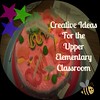I apologize for the lack of posts! I am back in school, which feels like I'm roller skating as soon as I walk through the building!
We just finished our 2nd week and although I don't have any pictures to share with you- go figure- I did want to talk to you about some of the activities we did! :)
In Science, we're discussing some KEY vocabulary right now. It is key because the vocabulary will be used the ENTIRE year. I think it is important to set a good strong foundation of these words...
I've noticed that the hardest words to actually understand is Observation vs. Inference, and then Qualitative vs. Quantitative.
So here are some things that we did...
I showed them a clear cup of water. I asked them to describe how it smelt, felt, looked, etc. We described the cup and the actual liquid inside. I then explained that by using our senses we make observations. **Clear, liquid, wet, etc.** Then I asked them to "INFER" what was inside the cup. All of them guessed water. I explained that by using our observations and what we already know we can make an educated guess as to what is inside the cup.
I then showed them another cup. This time inside the cup was a white powdery substance. Students described what they saw. A few times people said "it's baby powder" and I would stop and say is that an observation or an inference and we would discuss. We would then "INFER" what was in the cup and that is when I heard baby powder, baking soda, powdered sugar, etc.
I then completed an experiment and poured the water cup inside the cup with the powder, which was actually the diaper polymer. Students described what they observed. Then they "INFERRED" what happened.
Most of the students now were understanding, but a few were still confused. So I created Inference bags. I had three brown lunch bags in the front of the room the next day. I told students that inside the bags were items that could be found in my classroom. I told them that I would describe the objects based on what I observed before I put them in the bag. Students would then INFER what is inside the bag. They LOVED this activity.
Bag #1- pink balloon
Observations- stretchy, rubbery, pink, has an odor of rubber..
INFERENCE- Most classes thought it was a eraser.
Bag #2- sandwich bag
Observations- clear, plastic, has pink and blue stripes, no smell
INFERENCE- Most thought it was a straw
Bag #3- Bandaid
Observations- In a wrapper, brown, white square, sticky
INFERENCE- Most thought it was chocolate.
Students then picked an object around the room to observe and had their neighbor infer what the object was.
To help with Quantitative and Qualitative. I first wrote both of the words on the board. Underneath the l in Qualitative I wrote letters. Underneath the n in Quantitative I wrote numbers. We then talked about how qualitative observations use words, like all our observations from the days before. Quantitative involves numbers- so actually measuring or weighing. I competed the same diaper polymer experiment, but this time we measured the water, powder, and the gel substance that we ended up with at the end.
Students were then given random objects inside plastic bags and asked to write qualitative and quantitative observations about them. One bag contained beads, so for qualitative they described how it felt and the colors. For quantitative they told me how many beads and how many of each color. Another group received a graduated cylinder of water. For qualitative they described the container and the liquid. For the quantitative they told me how much liquid was in the cylinder.
The plans this week is to review the vocabulary words that we went over last week. We will also be studying the Scientific Method. Students will write their own raps, songs, or poems to present to the class!
I've already written myself a note to TAKE MORE PICTURES! ;)







Amber,
ReplyDeleteI really like that activity with observation and inference. I don't teach science but we definitely talk about inferences a lot in reading. I think I could modify it to use there. Great idea!
Stephanie
Forever in Fifth Grade
I think you could definitely make it work in reading! Let me know what you come up with!!!
ReplyDelete